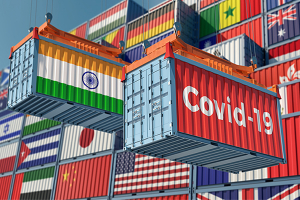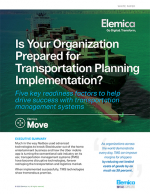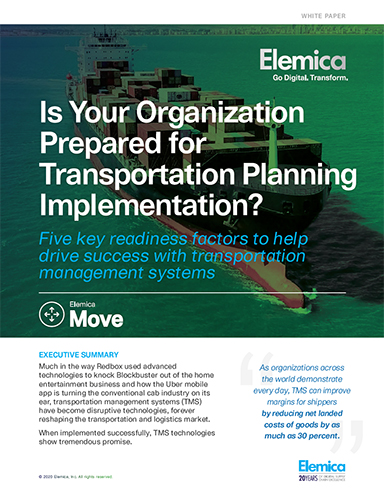Is Your Organization Prepared for Transportation Planning Implementation?
In this white paper, we detail five key readiness factors to help drive success with transportation management systems.
Transportation Management Systems
Much in the way Redbox used advanced technologies to knock Blockbuster out of the home entertainment business and how the Uber mobile app is turning the conventional cab industry on its ear, transportation management systems (TMS) have become disruptive technologies, forever reshaping the transportation and logistics market.
When implemented successfully, TMS technologies show tremendous promise.
“As organizations across the world demonstrate every day, TMS can improve margins for shippers by reducing net landed costs of goods by as much as 30 percent.”
Yet shippers and transportation and logistics companies today must understand that successfully implementing a TMS is about far more than the technology alone.
While the tools, resources, and solutions on the market are sound, they require the right environment and nurturing to deliver results.
Beyond the technology, a number of drivers ultimately determine the success of a TMS implementation and at the top of the list is readiness.
In other words, organizations not adequately prepared for a TMS implementation will invariably fall short of those companies that go into the implementation process with a carefully considered plan.
Although no two TMS implementation plans are or should be alike, the most successful ones share a holistic understanding of the structural processes in play that create a disruptive and effective transportation experience, along with an intensive focus on how the implementation will be affected by the skills required, the roles played, and the styles of management and coordination within the organization.
Five Key TMS Readiness Factors
To help companies reach such an understanding, this report describes five key “readiness factors” that Eyesight, in collaborating with some of the world’s top brands on a wide range of successful TMS implementations, has identified as fundamental to the success of a TMS implementation:
- Strategic TMS Footprint
- ERP Integration
- IT Resourcing
- Carrier Volume and Connectivity Options
- Business Unit Readiness
What’s Related




Favorites





